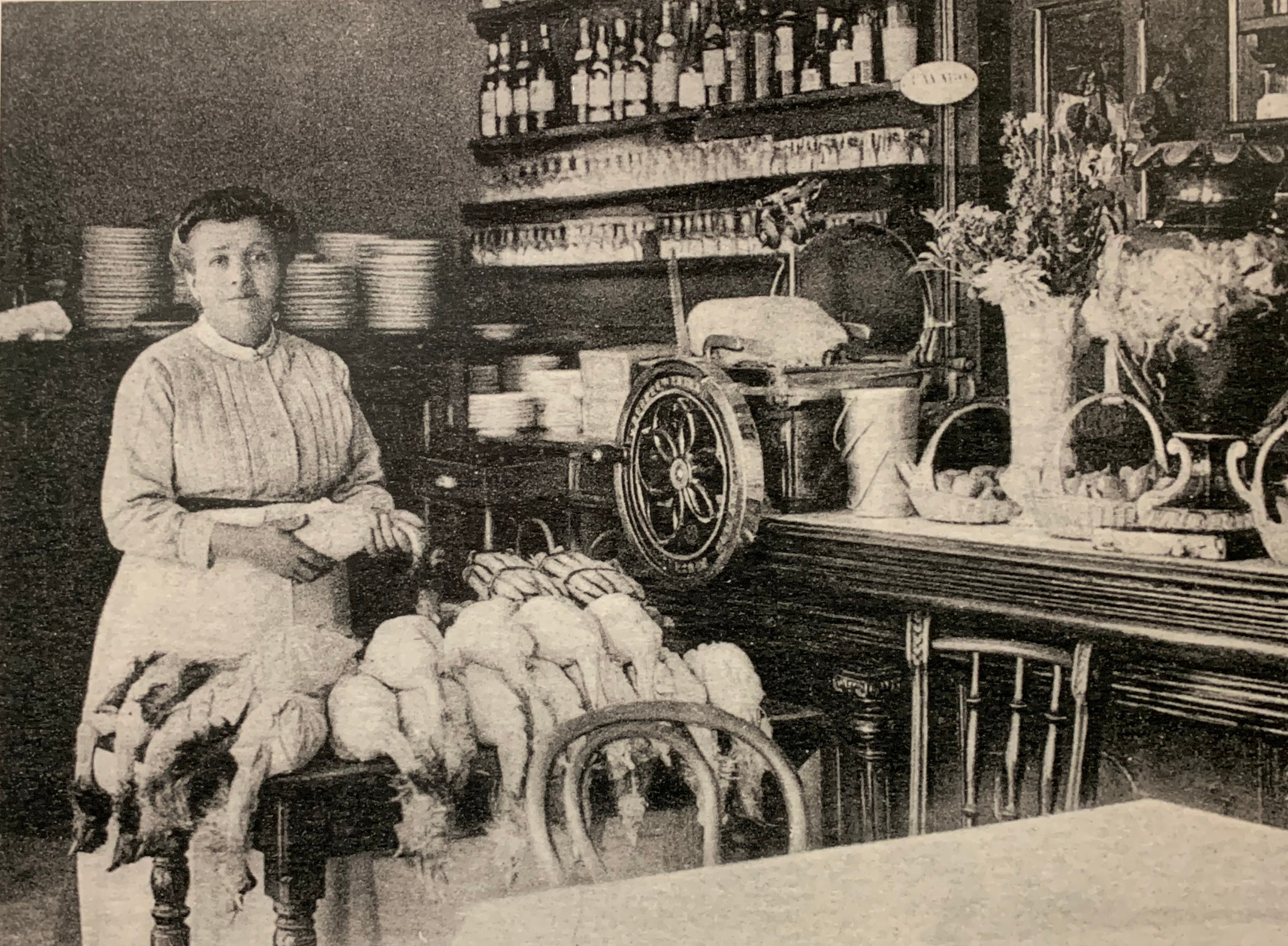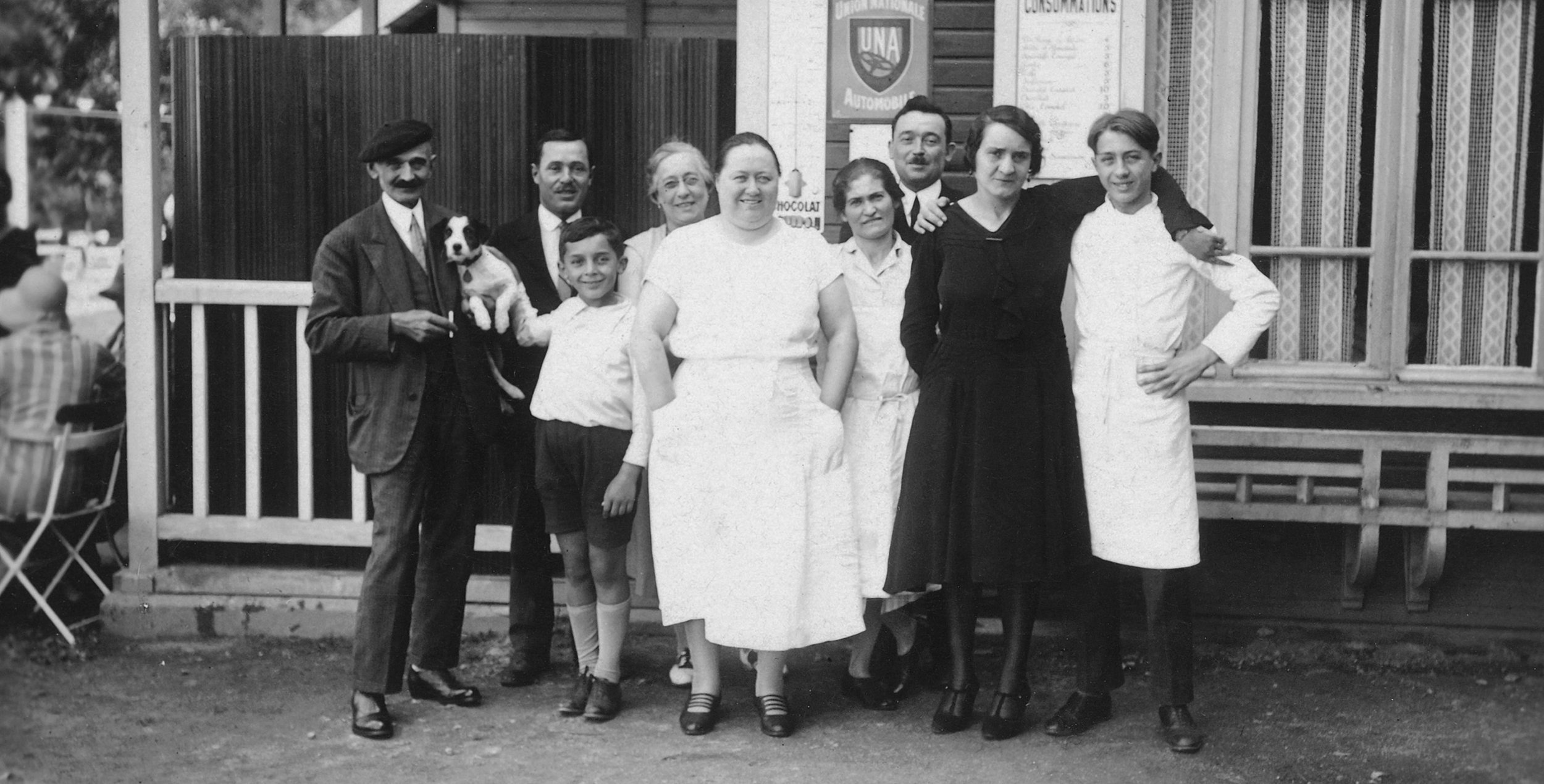Eugénie Brazier: The mother of French cooking
Eugénie Brazier (1895-1977), known as the ‘mother of modern French cooking’, was the first woman to win three Michelin stars and the first chef to earn six stars simultaneously.
“There was no showing off, no fireworks. The calm confidence, the certitude that all here would be as it should which one felt upon entering the establishment was somehow communicated to her customers by Madame Brazier herself, invisible though she was in the kitchen…”
Elizabeth David, An Omelette and a Glass of Wine (1984)
At the height of her fame, Brazier’s restaurants, which celebrated the cuisine of Lyon, attracted French presidents, prime ministers and celebrities, including the movie star Marlene Dietrich, who loved Brazier’s Langouste Belle Aurore (lobster with brandy and cream).
For a time, Eugénie was Lyon’s most famous chef and one of the most prominent in France. She also trained many great chefs, most notably Paul Bocuse, ‘the most celebrated French chef of the postwar era’. As Anthony Bourdain once said, when it comes to Lyonnaise cuisine, ‘Her influence runs right through every kitchen’.
The greatest soup in the world
“...my mother would bring the soup. I still remember the taste of that soup. It was milky with long slices of bread in it. I have never eaten better!”
Eugénie Brazier
Brazier was born in 1895 in Bourg-en-Bresse, Burgundy, on a farm not far from Lyon. Her family were poor and from a young age she worked on the farm, looking after the animals and attending school only in the winter.
When she was 20 she had a son, Gaston, outside marriage. Brazier once recalled that his birth was ‘something that was definitely frowned upon in those days’. To support her child she moved to Lyon in search of work, finding employment looking after another family. ‘I did everything’, she wrote, ‘including the cooking. I had plenty of mouths to feed.’
Earth-shatteringly operatic
“...her clashes with her teacher were earth-shatteringly operatic.”
Amanda Cohen, chef
After a few years, Eugénie left her employment and started working for the celebrated chef Françoise Fayolle (nicknamed la mère Fillioux), who employed only women.
The chefs who trained in her restaurant had a reputation for making delicious food; Brazier was no exception. However, ‘legend has it that as the student [Brazier] grew in stature and talent’, writes American chef Amanda Cohen, ‘her clashes with her teacher were earth-shatteringly operatic.’ This eventually led to a parting of ways.
Françoise Fayolle
At the age of 26, Eugénie bought a small shop where she opened her first restaurant, La Mère Brazier. The décor was simple and elegant, the servers all women. The menu was humble and never changed.
‘Each meal began with a plate of local sausage’, explained the Los Angeles Times, ‘The fish course was quenelles de brochet [creamed pike], then came her famous poularde en demi-deuil (chicken in half-mourning) and, after, fonds d'artichauts au foie gras (artichoke hearts with foie gras), which was usually served with a young Beaujolais.’
La Mère Brazier quickly became a top culinary destination and a second restaurant, Col de la Luère, opened soon after. (The journalist Bill Buford claims this second establishment was partly due to her success and partly because ‘she couldn’t stand to be in the same kitchen as her son’.)
In 1933, the Michelin Guide awarded Brazier three stars each for her two restaurants, making her the first chef in history to hold so many stars at once. It would take over half a century for another chef to reach the same status, when Alain Ducasse won six stars in 1997.
Quality queen
“A stout woman, Brazier is often pictured in the kitchen working proudly at her range… Her hair pulled up in a bun; she wears an easy smile for the camera. Often she would leave the stove to greet guests as they arrived.”
For many, it was Brazier’s personality and the legends that surrounded her, rather than the Michelin stars, which are most fondly remembered. She demanded the best from her staff. ‘Either you stuck by her principles, or you left’, Bocuse reminisced. But she was also known for her generosity, humour and hard work.
The most recent translation of her cookbook contains two stories which encapsulate her character. In the first, when an architect arrived late to a meeting with her she refused to see him until he had cleaned the windows. In the second, after an ‘upstanding local dignitary’ asked Brazier for discretion when he arrived at her restaurant ‘with a pretty young companion’, she replied, ‘Monsieur, I understand, just because you follow mass in a cathedral does not mean it is not permitted to say a prayer in a small chapel sometimes.’
Another profile of the great chef claims Eugénie was so hellbent on the quality of her food that she spent a week in prison for ‘repeatedly ignoring mandatory wartime rations.’ But she was also humble; her New York Times obituary notes that she turned down the French Legion of Honour, saying ‘it should be given out for doing more important things than cooking’.
Eugénie and staff outside La Mère Brazier
The first and the best
“There would have been no success for any of us without her; something we often forget these days.”
Paul Bocuse, French chef (1926-2018)
At the height of her fame, Brazier could have left Lyon to find greater fame in Paris or abroad
but she refused all offers of employment, including one from New York’s Waldorf Astoria. She wasn’t interested in fame or far off lands. ‘I have an instinct that stops me from putting my feet on ground that is not mine’, she once wrote.
Like that of many female chefs, the legacy of Brazier has often been forgotten or overlooked. Some publications, including the New York Times and Telegraph, incorrectly claimed that Ducasse was the first person to achieve the six star Michelin honour.
Even Paul Bocuse, Brazier’s former pupil, famously once said, ‘I would rather have a pretty woman in my bed than behind a stove in a restaurant. I prefer my women to smell of Dior and Chanel than of cooking fat… Women are good cooks, but they are not good chefs.’
Perhaps Brazier was an exception to this statement, as four decades later Bocuse wrote, ‘she remains one of the pillars of global gastronomy’, without whom ‘there would have been no success for any of us’.
Brazier and Bocuse
In a world that’s still recognises and rewards male chefs more highly than their female counterparts, it’s important to recognise women like Eugénie Brazier, who was the first, the best and one of history’s greatest chefs.









